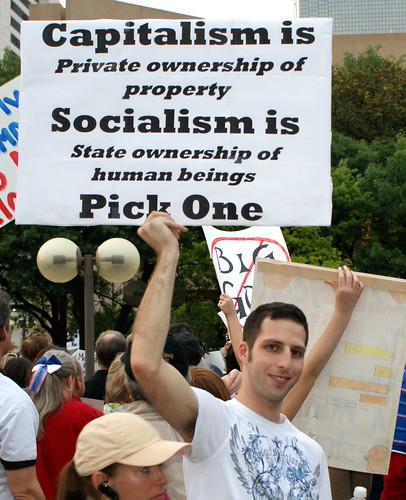“The Inherent vice of Capitalism is unequal sharing of blessings and the inherent virtue of Socialism is equal sharing of misery.” These words of Winston Churchill clearly depicted the pros & cons of both capitalist & socialistic economies. Both the economic systems are not perfect & not incorruptible.
In capitalism resources & goods are privately owned whereas in socialism resources are owned by the government or public. Distribution & earning of wealth is the main distinguishing element of both systems. In capitalistic society, people earn wealth for themselves while in socialistic society the earned wealth is distributed among everyone. In former system, government has no role to play other than ensuring that everyone is equal before the law but in latter government has a pivotal role of deciding that how the wealth is to be distributed in public. Government doesn’t interfere in individual business in capitalism whereas government can interfere in individual business in socialism. Capitalistic economy is highly influenced by demand & supply principle because such economies believe that competition brings best out of people & competition for wealth generation is essential element for the well being & progress of society. In socialistic economy, demand & supply principle has no role to play because such economies believe that cooperation among individual & care for everyone is the best theme which societies should imbibe for the well being of society.
Both the system of economies has its own merits & demerits. Capitalism do ensure speedy progress of the nation by virtue of competition. Everyone works for serving himself thus there is adequate availability of labour & human resource which adds up to the high growth rate of the economy. On the other hand, it doesn’t guarantee that every individual will get the minimum requirement of life which is direct violation of human rights. Thus the system has a inbuilt shortcoming of increasing the gap between rich & poor. The ubiquitous competition may act as a catalyst to corruption & bureaucracy. In socialism, people works for everyone, thus everyone gets what they want & when they want for free. Such a system is very effective in thwarting the curse of poverty & equalizes people on same standard. On different note, it lacks a motivation factor to contribute for the progress of society where every individual can get what they want without actually working for it. Such a society may result into a stagnant society with a low progress rate. It also doesn’t guarantee that government will be free from corruption & bureaucracy. The main crux is that both systems have some underlying merits & demerits. We should devise a new system which has merits of both systems such that it ensures healthy competition while safeguarding the interest of under-privileged.




On the other hand, it doesn’t guarantee that every individual will get the minimum requirement of life which is direct violation of human rights.
ReplyDeletethere is no human right being violated. nature causes starvation, not any man made system. you have a right to your life, not to being kept alive by someone else (except growing children)
Thus the system has a inbuilt shortcoming of increasing the gap between rich & poor.
this doesnt logially follow, and the definition of 'gap' is also important. if a rich person has 15 boats and a poor man just 1 car, is that a gap which is a problem? it is relative. the gap isnt the problem, the gap is the incentive as you rightly note. people living lives that are below minimum requirement, or unhappy lives is the problem. this is something cap prevents very well, as show by its incredible wealth production levels, where even africans have mobile phones
Smm Panel
ReplyDeleteSMM PANEL
iş ilanları
instagram takipçi satın al
https://www.hirdavatciburada.com
beyazesyateknikservisi.com.tr
servis
tiktok jeton hilesi